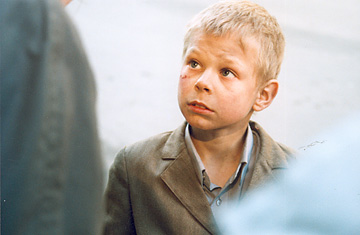
Kolya Spiridinov in The Italian
Vanya, however, is bereft. His dream is to be reunited with his birth mother, whose name he does not know. With the help of one of the whores, he learns to read, breaks into the safe where his records are stored, discovers her whereabouts and enters upon an odyssey of discovery that is dangerous — he is, after all, only 6 — yet touched by occasional grace notes. He is pursued by the adoption agent and her very tough bodyguard (if they don't deliver the boy they will not receive their fee) and in his travels he encounters people who wish to steal his money (and even his clothes), though he also runs into a few who help him along as best they can, in small ways.
This long passage will doubtless astound the American audience, since director Andrei Kravchuck, in his first feature, is unblinking in his portrait of ordinary life in the former Soviet Union. The landscape is uniformly grim and tumbledown, most of the citizens of have honed their survival skills to a nastily jagged edge. At no point does little Vanya eat a meal or walk down a street that would meet even the most minimal nutritional or aesthetic standards of even the poorest American child.
He is armored only in innocence and determination and those qualities blinker him. He has nothing to compare Russian life to; as far as he knows, the whole world is as gray and unpromising as the territory he traverses. There is nothing sentimental in the way little Kolya Spiridonov plays him. Like almost all the other players in The Italian, he is not a professional actor and so he seems not to be acting at all; every encounter, whether cruel or kindly, is naturalistically (and neutrally) accepted and processed by him, after which he proceeds along his way. As far as I can recall, he never cracks a winsome smile, never does anything to ingratiate himself with the adult world. He just keeps fleeing and fighting, surmounting every obstacle not so much with guile as with his implacability.
It's a terrific performance precisely because it is not a performance. That kid is entirely lost in the world Kravchuck has created for him to inhabit. And The Italian is a terrific movie precisely because it avoids all the cliches of the lost-child genre. It has, instead, the look and the feel of a documentary. There is something objective, almost reportorial, in the way it presents its story. It does not sue us for our favor. And it does not cue our responses. It trusts us take this almost silent little boy to heart at our own pace, in our own good time. The result is a movie that does not leave us awash in tears, but one that encourages us to think about what a close-run race the "Pursuit of Happyness" (oh, sorry, happiness) is, how often, the runner flirts with its opposite. We do not leave The Italian beaming. We leave it with relief, but with an ashen taste in our mouths, in our souls. Yes, Vanya emerges from his travels and travails OK. But we can't help think that in the hopeless world he inhabits, there may be worse to come.
